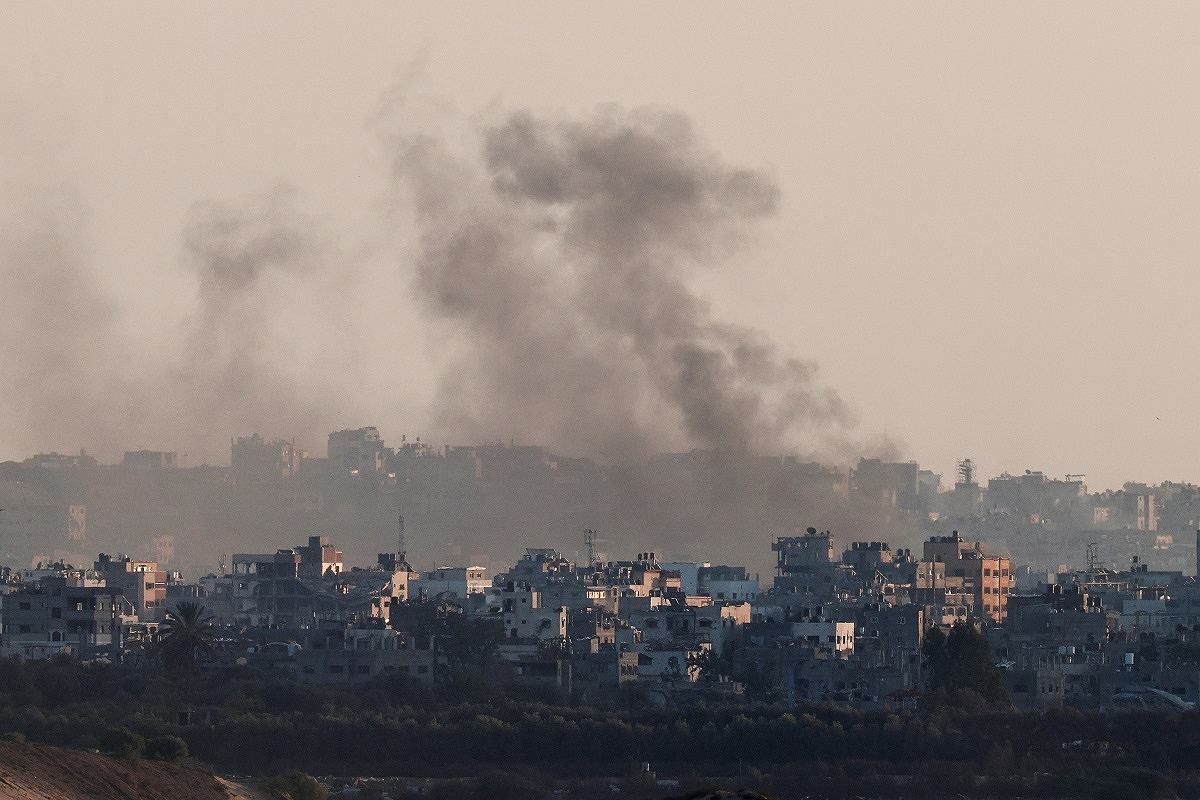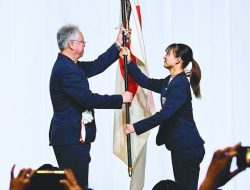
Smoke rises in northern Gaza, amid the ongoing conflict between Israel and Hamas, as seen from Israel, October 10, 2024.
16:08 JST, October 11, 2024
Two Al Jazeera cameramen were shot this week and are in critical condition, the network said Wednesday in a statement that accused the Israeli military of being “increasingly hostile toward media workers.”
Cameraman Fadi al-Wahidi was shot with a “bullet to his neck” while covering an attack on the Jabalya refugee camp in northern Gaza and remains critically injured, the network said. It also said that cameraman Ali al-Attar was shot Monday while covering the conditions of the displaced Palestinians in Deir al-Balah.
It comes as the Committee to Protect Journalists says at least 128 journalists and media workers have been killed over the past year of war in the Middle East, calling the numbers “unprecedented.”
“More journalists and media workers have died in the Israel-Gaza war than in any other year since CPJ began documenting journalist killings in 1992,” it said, adding that all but five of those killed were Palestinians.
“Al Jazeera strongly condemns the continued targeting of its journalists by the Israeli Occupation Forces,” the network said in a statement. “. . . The deliberate targeting of journalists is a flagrant violation of international laws protecting the press and humanitarian workers in war zones.”
The Israel Defense Forces told The Washington Post this week that it directs its strikes only toward military targets and operatives, and does not target civilians, including media organizations and journalists.
Al-Attar was “still in critical condition, deprived of the necessary medical care due to the siege imposed on the area,” the network said.
Jodie Ginsberg, chief executive of the CPJ, said the press advocacy group is “pushing for al-Attar’s immediate evacuation.”
“He is in a critical condition and needs urgent treatment that cannot be supplied in Gaza because of the destruction by Israel of Gazan medical facilities. The U.S. – a defender of press freedom – should urge this,” she wrote on X.
In August, Al Jazeera journalist Ismail al-Ghoul and cameraman Rami al-Rifi were killed in an attack west of Gaza City in the Shati refugee camp, where people were gathering after the death of Hamas leader Ismail Haniyeh. The Doha, Qatar-based network dismissed as “baseless allegations” Israel’s accusations that al-Ghoul had been a Hamas operative.
Last October, Reuters video journalist Issam Abdallah was killed and six other journalists were injured a few days after the war began. The CPJ on Thursday issued a separate statement that “a year later, Israel still has not confirmed if it has even completed a preliminary investigation into the attack.”
“Israel has not released information about the identities of the officials who authorized or conducted the strike, leaving the survivors with more questions than answers,” the CPJ said Thursday.
It added that investigations by the United Nations as well as those by Amnesty International, Human Rights Watch, AFP and Reuters had “all independently arrived at the same conclusion: that Israel conducted a deliberate attack on the journalists.” The CPJ said that deliberate attacks on civilians “constitutes a war crime under international law” and said the attack was “part of a pattern of impunity by Israel in journalist killings.”
Asked about those allegations, the IDF on Thursday repeated its claim that it “directs its strikes solely at military targets” and takes “all possible measures” to minimize harm to civilians, including journalists.
A photojournalist for the Hamas-run Al-Aqsa TV network was also killed in the same attack that injured Wahidi on Wednesday, that network said.
At funerals in Gaza, placing blue press vests and helmets on the bodies of fallen reporters, photographers and others has become a grim ritual as the death toll continues to rise.
Top Articles in News Services
-

Survey Shows False Election Info Perceived as True
-

Hong Kong Ex-Publisher Jimmy Lai’s Sentence Raises International Outcry as China Defends It
-

Japan’s Nikkei Stock Average Touches 58,000 as Yen, Jgbs Rally on Election Fallout (UPDATE 1)
-

Japan’s Nikkei Stock Average Falls as US-Iran Tensions Unsettle Investors (UPDATE 1)
-

Trump Names Former Federal Reserve Governor Warsh as the Next Fed Chair, Replacing Powell
JN ACCESS RANKING
-

Producer Behind Pop Group XG Arrested for Cocaine Possession
-

Japan PM Takaichi’s Cabinet Resigns en Masse
-

Man Infected with Measles Reportedly Dined at Restaurant in Tokyo Station
-

Israeli Ambassador to Japan Speaks about Japan’s Role in the Reconstruction of Gaza
-

Videos Plagiarized, Reposted with False Subtitles Claiming ‘Ryukyu Belongs to China’; Anti-China False Information Also Posted in Japan


























